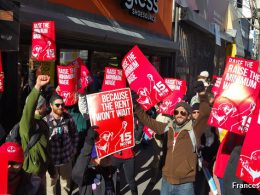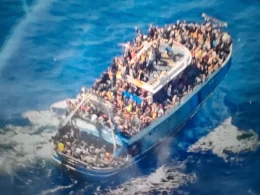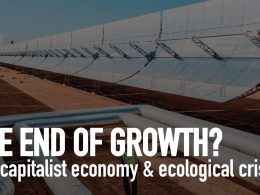War clouds are gathering, once again, over the Middle East. Heightening tensions over the last months between the US and its allies and Iran have seen covert assassinations of Iranian nuclear scientists, cyber warfare, attacks on Iranian military and missile installations, and a build-up of Western forces in the region and speculation of military preparations for air attacks on Iran.
All this is centred on Western claims that Iran is rapidly trying to acquire nuclear bombs, which the mass media faithfully repeats. Under this pretext, the US has imposed financial sanctions against Iranian oil exports, alongside a European Union oil embargo.
It is not Tehran’s ruling elite but working people and the poor in Iran who suffer the burden of the sanctions, which have already had a devastating effect through massive price hikes.
Nuclear proliferation
It is against these mounting tensions that the Guardian newspaper (25/02/12) leaked a confidential report by the United Nations International Atomic Energy Agency (IAEA) that claims Iran has “dramatically accelerated its production” of enriched uranium, while refusing to cooperate with an investigation of evidence that it “may have worked on designing a bomb”.
The IAEA report could lead to yet more sanctions against Tehran and increased military threats by the US and its allies.
The US Defence Secretary Leon Panetta warned that there is “a strong likelihood” Israel’s military will attack Iran between April and June.
In response, the Iranian regime denies it has ever carried out research or development on nuclear weapons and insists its programme is for entirely peaceful purposes.
Surrounded by the nuclear-armed Israel and Pakistan, hostile Gulf States and by US army bases, from the Iranian regime’s point of view there are some compelling reasons to want to acquire nuclear weapons.
It will not be lost on Tehran’s rulers that Gaddafi was overthrown in a Western-led attack on Libya, after giving up his nuclear programme in 2003. Afghanistan and Iraq, neither of which had nuclear weapons, were both invaded by the US and its allies. Yet Pakistan, which did harbour the Taliban and holds nuclear arms, was declared an “ally” in the US-led ‘war on terror’.
The people of Iran have the right, of course, to defend themselves from imperialist attacks. Socialists call for international solidarity, based on the workers’ movement worldwide, to stop imperialist aggression against Iran. A renewal of the revolutionary movements in North Africa and the Middle East, including possible revolts of the oppressed Palestinian masses and new upsurges of social protests and strikes in Israel, would be a powerful counterweight to Israeli and imperialist aggression and military interventions.
At the same time, socialists are also opposed to nuclear weapons, which ultimately can only guarantee ‘mutually assured destruction’, and campaign for the scrapping of all nuclear weapons, starting with those awesome arsenals held by the hypocritical big powers, like the US, Britain and France. Israel too holds hundreds of nuclear weapons and refuses to sign the Nuclear Non-Proliferation Treaty, or allow the IAEA to monitor its nuclear programme.
In their more candid moments, leading US officials admit that a nuclear armed Iran is not immediately pending. When recently asked: “Are they trying to develop a nuclear weapon?” Defence secretary Panetta bluntly replied: “No”.
The main motive behind the Western aggression towards Iran is the change in the balance of forces since the 2003 Iraq war and US-led invasion. The collapse of the Saddam regime saw Shia-based parties come to power in Iraq, which are influenced by Shia-majority Iran, as well as the strengthening of Iran’s position throughout the region.
The mass revolutionary movements that overthrew Western allies, Ben Ali in Tunisia and Mubarak in Egypt, last year, were further setbacks for the US and its allies in the region. In the view of US and other imperialist powers, Iran, like its ally Syria, acts as an obstacle to vital Western imperialist economic and strategic interests in the energy-rich Middle East.
Combustible situation
Although Washington seeks ‘regime change’ in Tehran, Barack Obama appears to want to avoid a military attack on Iran, at least until this year’s US presidential elections are over.
The US has already had to withdraw its forces from Iraq and is bogged down in another deeply unpopular, costly and unwinnable war in Afghanistan. Another open-ended war against Iran would be met with mass opposition in the US and across the globe.
But the US is not the only factor in this highly combustible situation. Israel is a vital ally of the US in the Middle East but the Israeli ruling class and military tops also have their own interests to pursue. Israel bombed similar nuclear civilian energy facilities in Iraq in 1981 and in Syria in 2007. The autocratic ruling elites of Saudi Arabia and other Gulf states – some of which have large, poor and restive Shia populations – are also pressing for military action against Iran.
The US’s growing and provocative military presence in the Persian Gulf and the escalation of tensions between the West and Iran risk triggering war, most likely starting with an Israeli bombing raid on Iran’s nuclear facilities. Iranian retaliation against Israel would see US and European powers conduct air and naval attacks against Iran.
In reply, Iran has threatened to blockade the Strait of Hormuz, through which over 30% of the globe’s crude oil passes. The conflict could spread, drawing in the pro-Western Gulf States.
Iranian masses
An attack on Iran would cause outrage among the masses of the region. Huge protest demonstrations against Western imperialism, Israel and the reactionary Gulf rulers would sweep the capitals. Such mass street protests would also act as a spur to the revolutionary movements in the Middle East and North Africa.
The Iranian ruling elite is attempting to exploit the Western powers’ sanctions and threats of a military attack to ‘unite’ the Iranian ‘nation’ behind it, to divert the masses from high unemployment, falling living standards and autocratic rule, and to paper over the deep cracks within the regime, which March’s parliamentary elections may further expose.
In the first instance, the masses will rally to defend the ‘nation’ against imperialist aggression. But Iran is not a ‘united’ country: a few rich people benefit from the exploitation of the majority. The regime has carried out attacks on workers and the poor, including cutting subsidies on essential goods. This is on top of a repressive, stultifying state that dictates every aspect of people’s lives.
Class issues and democratic demands will increasingly come to the fore, as well as open opposition to the regime.
In preparation for such mass movements, it is vital that the working class learns the lessons of the 2009 opposition protests that rocked Iran.
The limited appeal of the pro-capitalist, neoliberal leadership of the ‘Green’ movement, along with the lack of independent action by the working class, gave the regime space to brutally crack down on the protests.
The working class must rely on its own strength, as was seen in recent strikes and in the struggles to build independent unions. Neither the regime nor the pro-capitalist ‘reformist’ opposition leaders can guarantee jobs, housing, education, a living wage and lasting democratic rights or conduct a real struggle against imperialism.
Only a resurgence of mass opposition protests, led this time by the organised working class, can successfully struggle for democratic rights and fundamental social and economic change.
The working class needs to build its own independent mass party to struggle to overthrow the reactionary Mullahs and to fight for a workers’ and poor people’s government, which would take the huge oil wealth and other key parts of the economy into democratic public ownership and begin the social transformation of the country.












